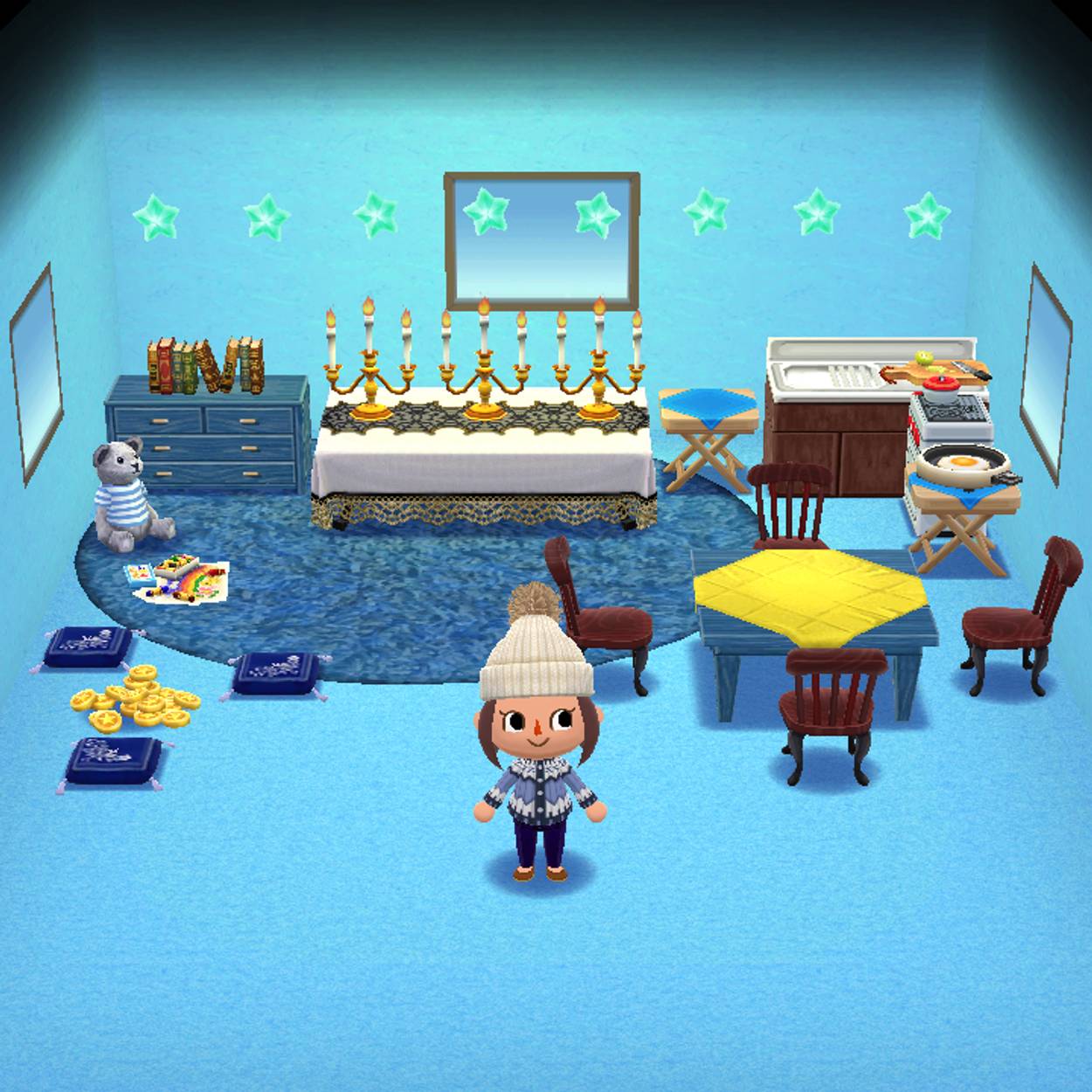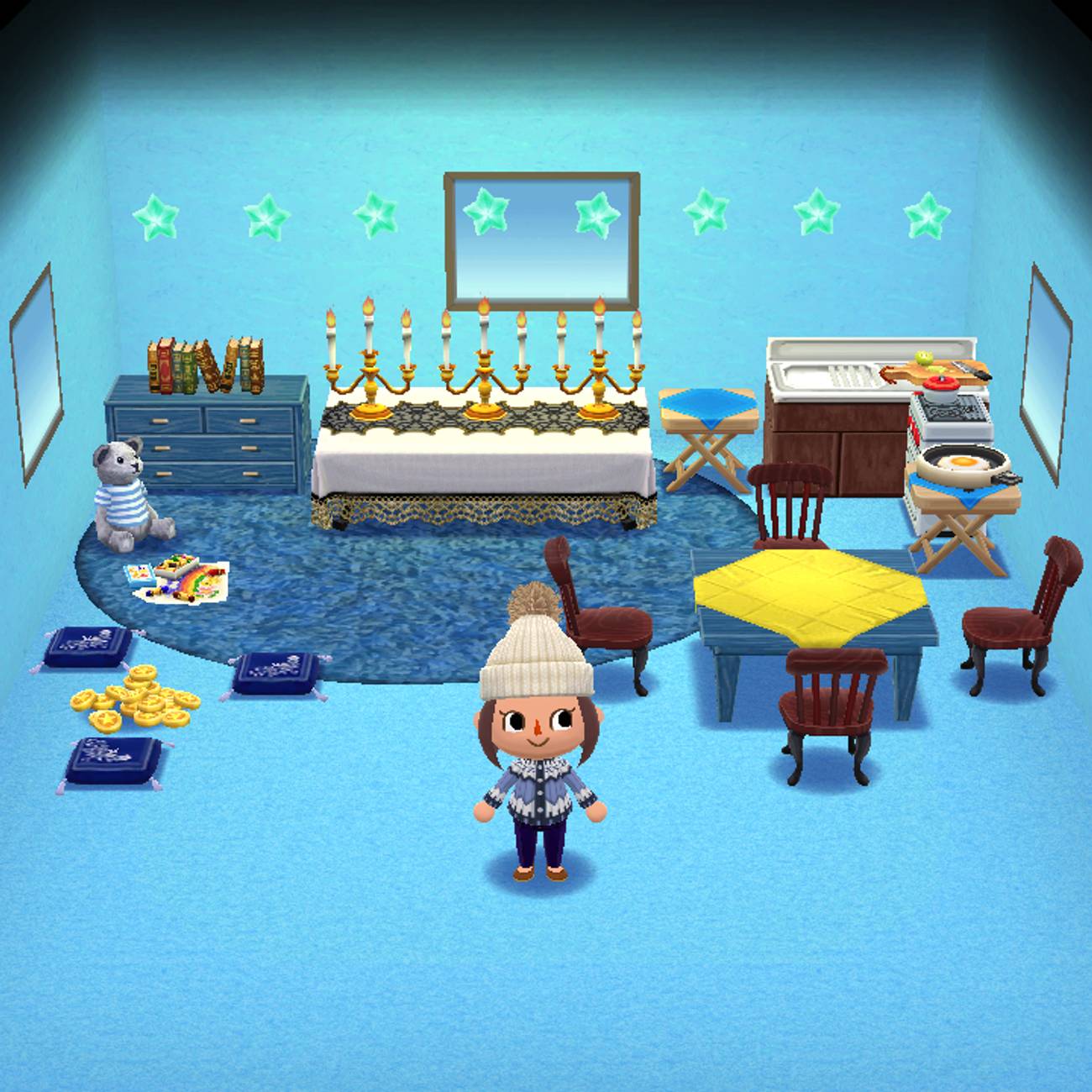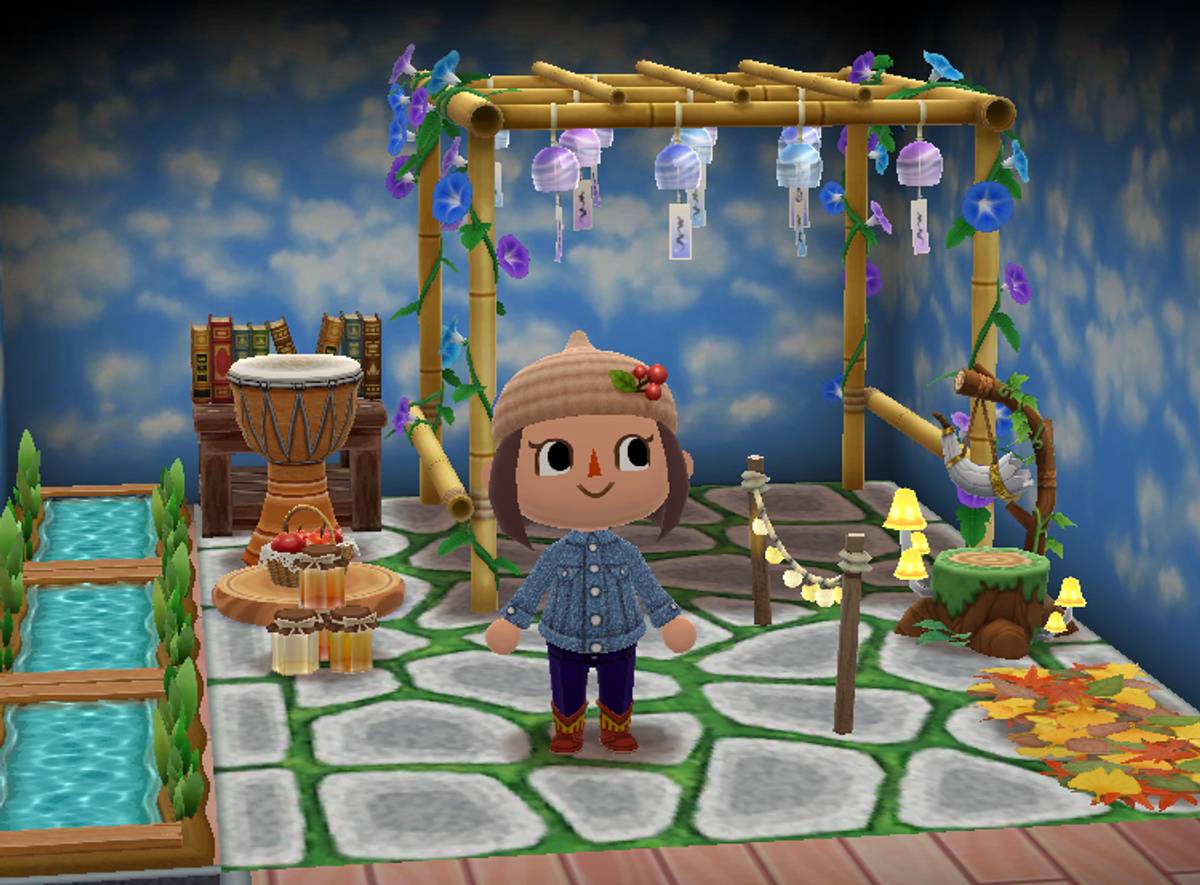Decorating for Hanukkah in Animal Crossing
The popular video game lacks most items you’d want to create a Jewish space. But with some creative repurposing, you can get your virtual home ready for the holiday.




As we were instructed last spring to stay indoors and limit physical contact in real life, I downloaded Nintendo’s popular social-simulation video game Animal Crossing to cure my boredom—and to be some fun escapism. In Animal Crossing, players use human avatars to interact with anthropomorphic animal characters in bucolic little towns. Since the game is open-ended, players spend their time fishing, catching bugs, and gardening without a clear end goal. The items they collect from these activities can be traded with other human players and animal characters or sold to earn in-game currency, which can be used to buy material goods to decorate one’s space as each player pleases.
I did not anticipate encountering religion in this carefree place of fun little tasks, or feeling the need to bring my real-world Judaism into this imaginary universe.
Each month, in my preferred version of the game known as Pocket Camp, there are themed events. My first event was the “Bunny Day” fishing tournament, in which I caught fish decorated with pastel designs. It was clearly an Easter event—even if that’s not what it was called—and I used my egg rewards to decorate my camp, ignoring the obvious Christonormativity. In June, the wedding-themed events featured virtual wedding bells and a chapel altar. None of it was explicitly religious but the style was more goyishe than Jewish, with nary a broken glass or chuppah in sight. In October, the gardening event’s pumpkin patch and jack-o’-lantern costumes clearly drew inspiration from Christian and pagan rituals. Regardless, I continued playing, but my virtual world—which I could theoretically shape in my vision—wasn’t quite reflecting the space I wanted to make.
I’m used to Christonormativity in everyday life; we all are. No matter where we turn, we are confronted with cultures and inspirations that we know well but are not what we typically bring into our own homes. So as I sat in my living room indulging in my virtual escapism, encountering this Christonormative paradigm once again demonstrated the prevalence of a culture in which I don’t belong.
My solution: to play my way out of it.
In late summer, I earned an in-game reward called “beige wind-chime trellis.” But to me, I had a sukkah! It wasn’t perfect, but in a virtual world with anthropomorphic animals, its bamboo structure and celebratory decorations were kosher enough. Inspired, I put the item in my game storage for virtual safekeeping. As the High Holidays approached, I collected apples, jars of honey, a river for tashlich, and a goblet drum that looks like the one my parents have from Israel. I repurposed leather-bound books into siddurim, a “fairy forest horn” into a shofar, and string lights into a mechitza. And then, I built my little High Holidays scene. My campsite finally felt deeply familiar.
I anticipate the upcoming winter holidays in Animal Crossing will again be Christonormative. While in years past Nintendo masked Christmas as “Toy Day,” with the influx of reindeer, yule-log cakes, and red and green costumes, I can see through the name. Perhaps because of these conventions, I am determined to make my virtual cabin once again a place that reflects me and my Judaism this Hanukkah. Just like previous years in the physical world when I’ve discovered that Jewish decorations are elusive, I’m now on a long hunt for items that are reminiscent of Hanukkah—even if they weren’t originally intended to be. I’ve saved my bells and leaf tickets (the in-game currencies), eager to trade them in for items to repurpose in the marketplace and to purchase seasonal cookies with prizes inside. So far, this has been somewhat effective. My avatar’s menorah will be three three-candle candelabras whose little flickering flames approximate the real hanukkiot I’ve watched as their nine candles glow. My chocolate gelt will be a pile of gold coins I earned in the pirate-themed games this summer. The frying pan for latkes will instead be a hot plate with an egg. I’ve also collected blue decorations and furniture: Blue five-pointed stars will be strung across my cabin, blue floor cushions are ready for virtual people to sit on if I can find an elusive dreidel, and a blue table with a gold tablecloth is ready for a shared meal with virtual friends. A blue and white teddy bear and a coloring set strewn across the floor are the celebratory presents. Sufganiyot, sadly, are nowhere to be found in the Animal Crossing universe.
In a few months’ time, Hanukkah will pass and I’ll be onto my next Animal Crossing holiday. I’ll be repurposing the virtual Halloween costumes I won in the fall as Purim costumes; soon after that, I’ll be rearranging my virtual space to make use of my Egyptian headdress and leaving an extra cup on my virtual table for Pesach. I anticipate that searching for a virtual afikoman might be a step too far.

I’m not the only one who wants a tiny bit of Judaism in Animal Crossing; there are conversations across online forums where players express their desire for virtual latkes. And like me, some players have taken the initiative to build a more inclusive world into the game: Jewish players have repurposed Kwanzaa candelabras into menorahs, one player created and uploaded a shirt with a tallit design, another uploaded magen david patterns to make wallpaper, and UC Berkeley’s Magnus Collection of Jewish Art and Life uploaded paintings and photographs from its collection onto virtual posters. There’s clearly a small but dedicated audience for Animal Crossing-supplied Judaica.
While Animal Crossing is only a silly game, its objective remains to decorate your own space according to your own vision. It provides the tools for people to make fantastical spaces with anything from tropical pirate ships to zen spas, while also providing the objects seen in people’s everyday life: bedroom dressers, bicycles, fish tanks, garbage cans, and more. But what makes a space mine and decorated in my vision is being able to decorate for my holidays. I want my pirate ship or zen spa to have the option to include a menorah in the window and to have my anthropomorphic unicorn friend munch on virtual latkes with me. My fantastical space with magical elements does not need to ignore that Judaica is in my life and in my real-life home. And to be clear, I’m not asking for Nintendo to make Animal Crossing: Shtetl, even if an anthropomorphic canine character named Lazar Wolf would make me snicker.
Nevertheless, there is something deeply familiar about now spending my time hunting for virtual Hanukkah items. In physical stores, I also search high and low for the one aisle or the one shelf where the menorahs and blue decorations have been relegated in a sea of Christmas trees and tinsel. In both the physical and virtual worlds, I actually enjoy the challenge of keeping our culture alive and actively taking steps not to assimilate. But in both worlds, I wish there were more options and that the default was not Christonormativity.
Blaire M. Moskowitz is a Ph.D. Candidate at the University of Leicester researching museums and their interactions with online communities.